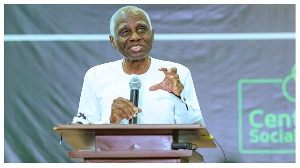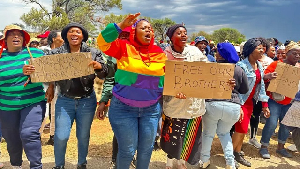Key representatives of companies and institutions in the implementation of the Nestlé Cocoa Plan have visited Koniyaw, a beneficiary community of the project, in the Bekwai Municipality of the Ashanti Region.
The exercise was to allow the delegation, including Dr Sascha Raabe, a German Parliamentarian, to know more about the Plan, which relates to Child Labour Monitoring and Remediation System, Village Savings and Loans Association, as well as Gender Action Learning System.
Some 144 cocoa farmers, each having an average land size of about 2.5 hectares, had been rolled unto the Plan at Koniyaw.
Ms Marie Chantal Messier, the Head of Corporate Communication and Public Affairs of Nestlé Central and West Africa Limited, a leading food and beverage company, in an interview with the Ghana News Agency, said the project sought to support the farmers to adopt modern agronomic practices to increase yield.
It is also to help address child labour issues in cocoa production, deforestation, gender inequality and poor social conditions in cocoa growing communities.
Ms Messier said the Plan aimed at securing high-quality cocoa beans from legal and approved sources for their businesses while increasing the profitability of the farmers.
“Child labour has no place in our supply chain,” she said, and that since 2017, the project had been instrumental in creating awareness amongst farmers on acceptable practices in the course of their work.
“It is work in progress, we hope to do more in achieving our targets,” she said.
Mr Prince Gyamfi, the Country Deputy Director in-charge of the International Cocoa Initiative (ICI), a programme seeking to end child labour in cocoa growing communities with various interventions such as educational support, said engaging the child in all forms of labour was prohibited under international and local laws.
He, therefore, lauded Nestlé for working closely with the ICI to educate farmers on the hazardous nature of child labour as well as its negative effects on the development of the child.
Ms Marjoliyn Hekelaar, the Sustainability Representative of Cocoanect Ghana, a cocoa trading and supply chain management company, which is one of the implementing agencies of Nestlé Cocoa Plan, said the company was committed to ensuring better lives and livelihoods of the beneficiary farmers.
She said high on its agenda was to promote the inclusion of women in household decision-making and access to finance for the sustenance of beneficiaries.
Mr Fred Kukubor, Nestlé Cocoa Plan Manager, Ghana, briefed the delegation on the various aspects of the Plan and how it was transforming the lives of the cocoa farmers.
Some of the beneficiary farmers, especially those at Gyasikrom near Asante-Bekwai, from a meagre average production of seven bags per hectare, now produced about 20-25 bags since aligning themselves to the Plan, he said.
Madam Deborah Kwablah, the Corporate Communications and Public Affairs Manager of Nestlé Ghana, urged children of the farmers to take their education seriously to become responsible citizens in future.
Dr Raabe, on his part, applauded Nestlé and partners for the good work in improving the livelihoods of the farmers and working on child labour monitoring system.
He called on stakeholders to intensify and expand the monitoring campaign to ensure that children did not get involved in hazardous activities on the cocoa farms.
Business News of Friday, 5 April 2019
Source: ghananewsagency.org

















